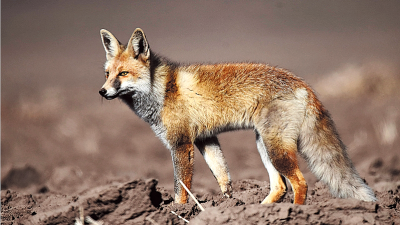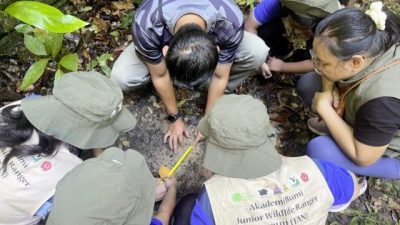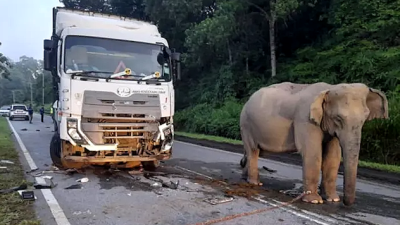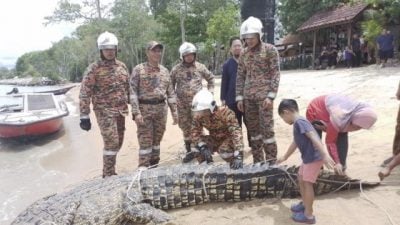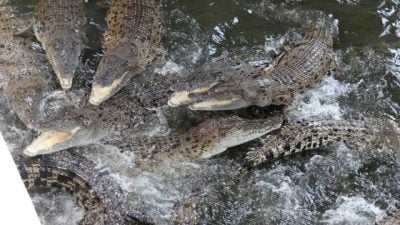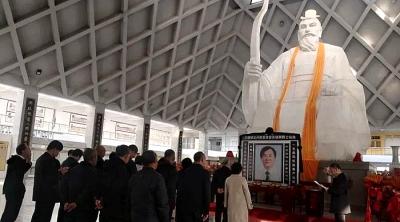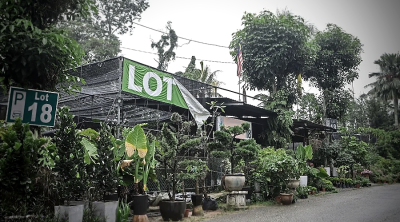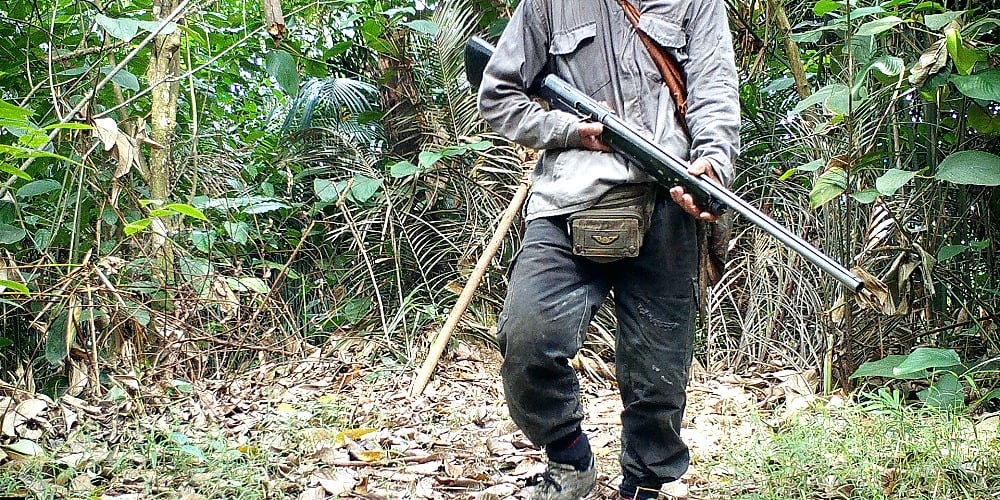
The Department of Wildlife and National Parks Peninsular Malaysia (PERHILITAN) Director-General Datuk Abdul Kadir Abu Hashim is of the opinion that escalating wildlife crimes could be attributed primarily to rising demands in wildlife black market.
PERHILITAN has identified several forest entry points and hot spots of illegal poaching activities. However, the department’s current 1,000-member community ranger teams have been unable to cover such a large area.
As a consequence, the government has set a goal to triple the current strength to 3,000 by 2025 in order to more effectively carry out the mission of wiping out illegal poaching activities.
Wildlife animals recovered by the Customs Department will be sent back to their original habitats if they are still alive, while external species will be sent back to their original countries, Abdul Kadir explained.
“If the animals are already dead when recovered, such as pangolins and elephant tusks, and their countries of origin have no intention of taking them back, they will then be burned.
“Nevertheless, some confiscated animal organs may be kept for conservation education and species identification purposes.”
According to Abdul Kadir, critically endangered animal species in Malaysia include Malayan tigers, wild boars, Malayan tapirs, and rusa sambar.
Take Malayan tigers for instance, according to the 2016 National Tiger Survey (NTS), there were only 150 left in the country, considered a critically endangered species.
Shrinking habitats
There are several factors contributing to the sharp decline in the Malayan tiger population, including illegal poaching for food, souvenirs or traditional therapies.
Abdul Kadir insisted that shrinking habitat could be another reason for the species’ dwindling population.
Animals losing their natural habitats may encroach into human settlements, causing human deaths and destruction of crops.
“When their habitats are becoming smaller and smaller, they will also lose their sources of food and be forced to traverse once forested land but now developed with road infrastructure.
“We often hear of wild animals getting killed by passing vehicles.”
On the threat of urbanisation to wild animals, Abdul Kadir said, “We need to face the negative impact of the the on-going urbanisation process. This is what we have been doing all these years.
“Nowadays, humans have come into conflict with wild animals such as monkeys, elephants, tigers, civets and boars.
“To address this problem, we need to work closely with the relevant authorities such as the state governments, civil defence corps, and fire and rescue department in order to mitigate such conflicts together.”
He said environmental impact assessment (EIA) report must be submitted before any development project is implemented. The report must include the project’s impact on native wildlife as well as solutions to their conservation.
He said one of the ways to minimise wildlife impact and conflicts is to construct animal bridges or viaducts, or jungle corridors that allow free animal movements to prevent them from straying into human settlements or farmlands.
Human-wildlife conflicts are common when elephants wander into farmlands or villages on the verge of the forest, causing damages to the crops.
“Such wildlife corridors have been set up in some estates in Sarawak.
“We will continue to coordinate with estate owners and villagers on how to set up wildlife corridors to minimise conflicts.
“Meanwhile, animal viaducts have also been constructed in Kuala Lipis (Pahang), Aring-Tasik Kenyir Road (Terengganu) and Gerik-Jeli Road (Perak), where animals can safely cross to opposite site of the road through tunnels.”
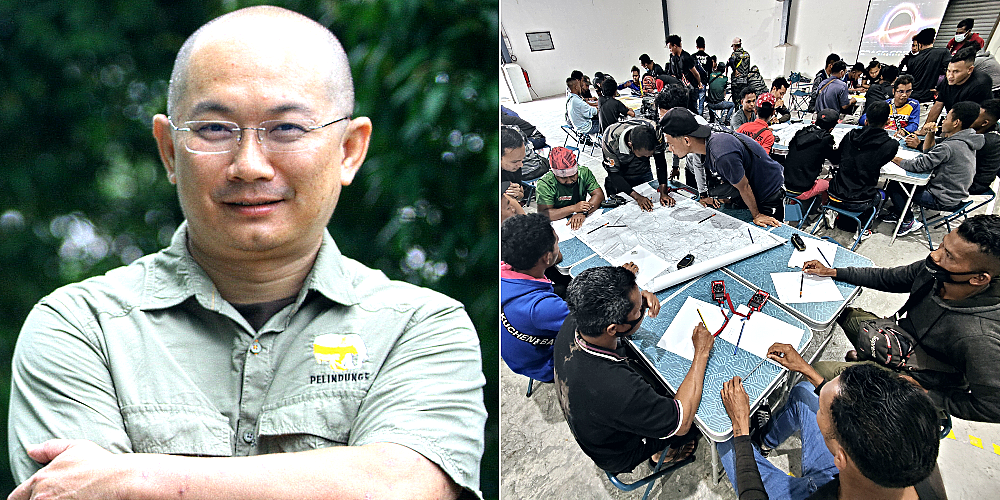
Public fund raising
PELINDUNG (Pertubuhan Pelindung Alam Malaysia) is one of the non-governmental organisations joining VetOA’s jungle patrol mission.
Hailing from Muar, Johor, PELINDUNG founder Liang Song Horng pursued a biology course at the University of Victoria in Canada after graduating from Muar Chung Hwa High School, and has since been involved in animal conservation works.
He set up PELINDUNG in 2016 to spearhead the country’s animal conservation mission.
He told Sin Chew Daily that PELINDUNG’s jungle patrol squads are operating mainly along the Titiwangsa Range on Peninsular Malaysia, from Gua Musang in Kelantan through Genting Highlands.
“Under VetOA’s jungle patrol program, PELINDUNG’s role is to manage and coordinate with the aboriginal rangers, and provide them with the equipment and devices needed.
“Although they are paid by the government, equipment and food provision are the responsibility of NGOs. That’s why we need to raise funds annually to support the patrol operations.”
Given the country’s humid tropical climate, equipment brought into the jungle are prone to damage, and as such two sets of equipment have to be prepared every month.
This year, PELINDUNG is responsible for nearly 300 rangers from 26 aboriginal settlements working in around 50 teams, each comprising four to five members responsible for different forest zones. As such, demand for equipment is high.
Understaffed
PERHILITAN will increase the number of rangers to 500 people in over a hundred teams, translating into significantly increased expenses.
“From what we know, the tiger habitats on Peninsular Malaysia cover nearly 40,000 square kilometres. By international standard, there must be one ranger for every 10 square kilometres, and we therefore require a total of 4,000 rangers. The thing is, we only have 1,500 at this moment,” said Liang.
He said the aboriginal rangers will have to undergo training before they can carry out their duties.
Once they have detected any illegal poacher, they will need to contact PERHILITAN through wireless satellite communication devices.
“Some of them are carrying weapons, even guns, and this poses tremendous danger to unarmed rangers.”
Liang said he came across illegal syndicates hiring Vietnamese and Cambodian poachers, the former targeting mainly tigers while the latter looking for agarwood.
Other than tigers, other wild animals that may fall into the traps set up by the poachers include elephants, panthers, dholes, deer, Malayan tapirs and sun bears.
The National Tiger Survey (NTS) conducted between 2016 and 2020 found the number of Malayan tigers down sharply to just 150.
“Prior to 2016, there were only rangers from PERHILITAN and a handful of NGOs, and the number was not enough to completely stop illegal poaching activities. That’s why we later had VetOA.
“The Malaysian government has since been forking out substantial sums of money from the annual budgets to pay for the salaries of rangers while inviting NGOs to help manage the expanded ranger teams and raise funds to purchase the costly equipment and devices.”
PELINDUNG’s VetOA teams venture into the forests for over 20 days each month to carry out their operations.
Whenever PELINDUNG needs to hire additional rangers, it will travel to most aboriginal villages along the Titiwangsa Range to meet the village chiefs who will then recommend the suitable candidates.
“Other than a stable salary, most importantly the rangers will also be able to defend the places their ancestors have been dwelling for generations. Protecting their homeland has become their mission.
“Although most of them do not have high education, they are rich in jungle survival skills, and can carry out their duties after being trained how to use the sophisticated devices.
“We only set the rough patrol area, and it is up to them to decide their routes.
“As such, they must have strong discipline and resilience in tackling the varying conditions that may pop up inside the jungles, be it the illegal poachers or wild animals.”
As the rangers do not wear uniforms, poachers will have no way to tell whether they are rangers or just ordinary villagers. And the rangers will never expose their identities and will try to avoid head-on clashes with the poachers. All they do is to quickly leave and inform the enforcers.
Liang said tiger hunting is primarily carried out by foreign poachers. When the national borders were shut during the pandemic, there was a respite in poaching activities, but with the borders now open, there has been a resurgence in poaching activities since last year.
The biggest challenges encountered by PELINDUNG are the funds for the purchase of equipment as well as manpower shortage, although there is not much problem getting rangers, as many young aborigines are keen to take up the offers, many even still in the waiting list.
“Saving the wild animals is our most urgent mission. If we don’t save these endangered animals within three years, we may lose them forever, including the Malayan tigers.”
Besides corporate sponsors, the issue of wildlife conservation has also drawn the attention of the royal family.
Liang revealed that the Regent of Pahang Tengku Hassanal Ibrahim Alam Shah and the state government gazetted over 2,000 square kilometres of forest areas as state parks last year, including Fraser’s Hill.
The bill was passed in August and was implemented within a year, setting a precedent not only in Malaysia but also the world, in the implementation of a gazetted state park within just one year.
“Under Malaysia’s law, any protected forests in Malaysia can be withdrawn or converted, but not state parks. It is hoped that the Pahang state government will set a good example for other states to emulate.”

Read:
ADVERTISEMENT
ADVERTISEMENT






